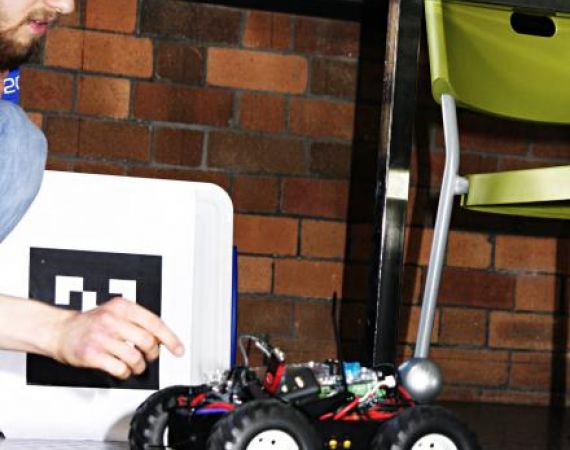Posted on Tue 27 Mar 2012
Lunch time Talk: The Most Dangerous Game: Exposing Sixth Formers to Power Tools
Sam Phippen and Tim Jones are undergraduate computer scientists at Bristol University, together, along with their constructed robot Alice, they presented the student robotics programme that they run for sixth formers at various schools in Bristol. The project culminates in a robotics competition,…

Sam Phippen and Tim Jones are undergraduate computer scientists at Bristol University, together, along with their constructed robot Alice, they presented the student robotics programme that they run for sixth formers at various schools in Bristol. The project culminates in a robotics competition, where the students demonstrate their acquired skills in engineering, electronics and computer programming put into practice.
This initiative has taken off further afield too, as groups of students in Southampton as well as in Munich and Grenoble put their collective heads together to create and build robots in order to compete against each other. Numbers have soared from 20 to an impressive 184 I the years they have been involved with the programme.
To introduce us to the type of technology being produced with the student robotics programme Sam reminded us about the radical advances in technology we have seen in the past 30 years and the impact new technologies has in our day to day lives. The Internet was born 20 years ago and since then we have the ability to build web platforms and vast accessibility to use new types of services. Technology has become increasingly more present in our daily lives, therefore is it not more important for us to understand it and recognise the mechanics and work that goes into making things happen?
A seemingly important point for Sam and Tim is to reach, as they put it: “normal sixth formers” in other words to make contact and teach new skills to audiences who may have had no experience at all in designing, building and programming robots, to understand some of the basic principles behind programming in order to set them up for the future of technology.
Sam and Tim are part of a larger team of university students who go into schools providing raw materials and sometimes tools in order for sixth formers to build a chassis for their robots. The team teach how to create all aspects of a fully autonomous robot, including how to use python, a programming platform. They use the circuits board designed in their spare time to develop the games included in the final competition. These games are devised to give sixth formers an engineering challenge, encouraging creativity to present different approaches in scoring points.
The University students also lead technology building workshop days, where all participating schools come together, bringing in their robots for a hack day, this provides a platform to the sixth formers to experiment with what they have made and is also a good opportunity to compare and contrast their skills in a beneficially way.
Sam leaves us with a picture of a sunset taken on mars by a semi autonomous robot, it’s probably fair to say that the engineer who built that robot was probably experimenting with programming technology and robotics at 16, Sam goes on to say: if we can inspire one or two students to realise similar achievements when they grow up that’s mission accomplished from where I’m standing. I think this is a really good end goal to have” We can’t help but agree!
For more information or to get involved with the Student Robotics competition visit https://www.studentrobotics.org/